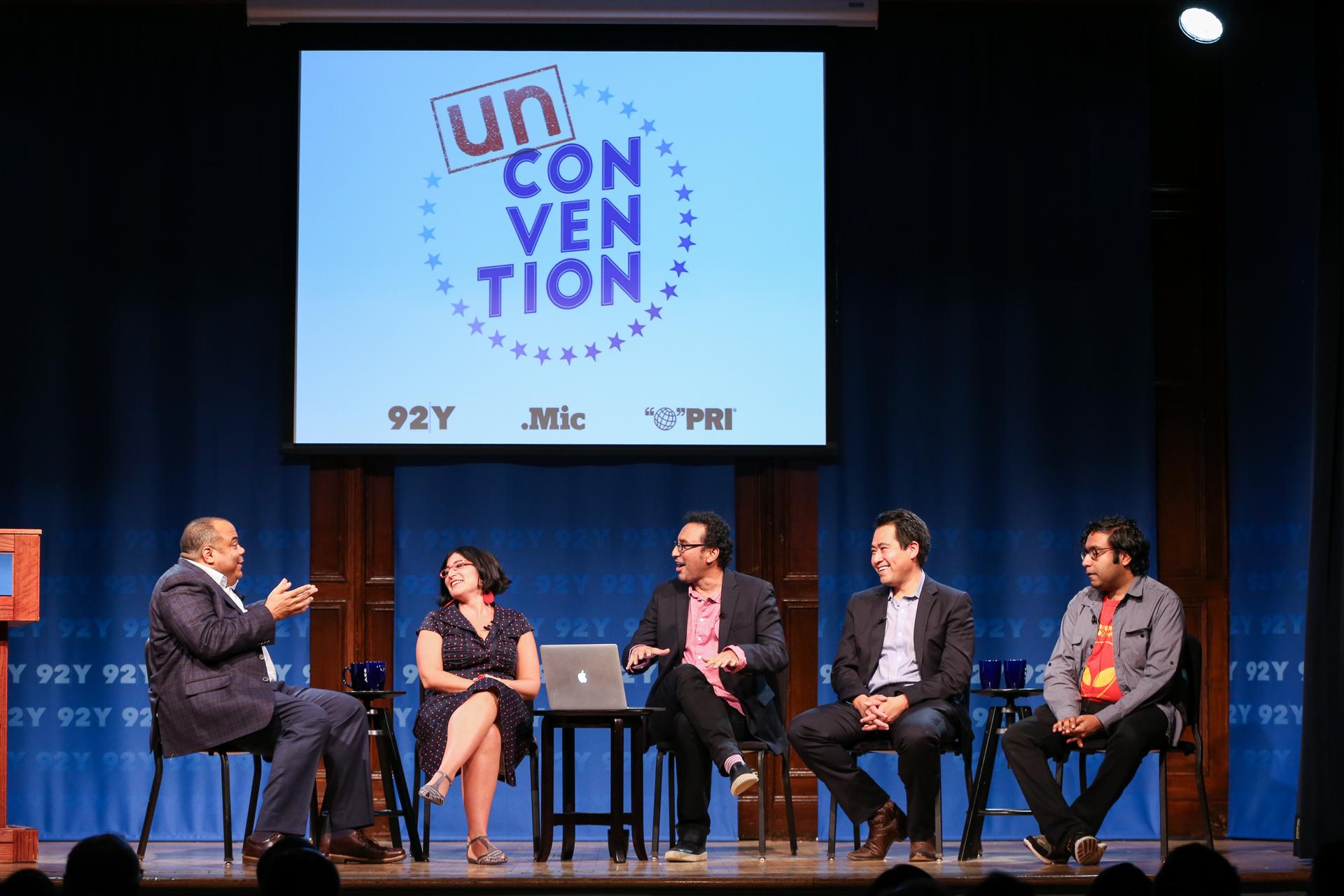How fear of diversity has led to the ‘civil war’ of this election
Eric K. Ward, from left, Negin Farsad, Aasif Mandvi, Israel Ortega and Hari Kondabolu discuss diversity and American identity at the 92nd Street Y in New York during The UnConvention, October 17, 2016.
Fear of the “browning of America” has been the subcurrent running through the 2016 US presidential election. And that explains a lot of the vitriol, according to a panel in New York City Monday night hosted by actor and comedian Aasif Mandvi. It’s an idea that scares many white people.
Forecasted more like an oncoming storm than a natural population shift, this demographic change is expected by 2050 or even earlier. At that point, the number of non-white Americans will outnumber white Americans.
“This whole discussion around 2050 and the change of diversity is much more a civil war within the white community than it has to do with folks of color,” said Eric Ward, a human rights leader and Ford Foundation program officer. “We should take no joy in the economic discombobulation that is happening in this society: That people are suffering, people can’t afford their healthcare, people are working three jobs.”
The panel was the first of a week of events in New York City called The UnConvention, a collaboration among 92Y, Public Radio International and Mic to highlight the views and issues important to young adults in the 2016 US election.
That fear of the browning of America, according to Ward, presupposes that, as of 2050, “every minority community is all of a sudden going to get along and align together and then choose white America as its enemy.” Unlikely, said author and producer Negin Farsad, also on the panel Immigration, Identity and the 2016 Election held at the 92nd Street Y.
“Minority groups are not like all supporting one another,” noted Farsad, who also does comedy. “The ‘good’ news is minority groups can also be racist against each other: We should be a little bit more bro-like, but we’re not yet.”
For Farsad, the demographic shift just means the rest of the country is going to look like New York City today.
READ MORE: We asked millennials to share their slogans for the 2016 election. We want yours, too.
Another panelist, comic Hari Kondabolu, argued there was something “intrinsically racist” about the way the numbers are put forward, as they reductively separate the country into “white” and “non-white.”
“When you talk about people being afraid of being the minority, it doesn’t come out of anywhere,” Kondabolu said. “I think it’s the government fear-mongering with things like that, and the media running with it.”
“I think it’s propaganda for those who are afraid of democracy and the changing nature and diversity of America,” added Ward. People don’t see that “many of us can hold many identities.”
This election’s “us vs. them” mentality is a result of the perfect storm of economic disparities, fear and ill-placed nostalgia for “better” days.
Conservative political commentator Israel Ortega believes the book Hillbilly Elegy by J.D. Vance is “the Rosetta Stone to understanding the Trump voter” and the anger and fear often directed at immigrants from poor and working class white people. Vance grew up in Ohio and Kentucky and Ortega said it captures the mood in that part of the country.
“We’re moving away from very industrial factory jobs to an economy that is just not the same that it was 40 years ago," said Ortega. "So that’s, I think, a proper challenge for any policy-maker now: How do you bring people who may not want to go to college and provide them with the ability to provide for their families the way a factory job used to in this country?”
“What is happening to white America, we should be clear, is horrifying and it happened to communities of color and single women decades ago,” noted Ward. He says of course racial privilege still exists for white people, but poor whites have trouble seeing that through the lens of their own struggles.
“To work out of this problem, we should be supporting those in the Republican party who are trying to hold onto an inclusive idea of what this society should be,” Ward said. “The battle within the Republican party is one of the historical battles of our time.”
READ MORE: Millennials get their political say during week-long UnConvention in NYC
And that, said moderator Aasif Mandvi, is the challenge after November, after such vitriolic talk during the campaign. “Let’s assume that Trump loses this election, there’s still 35 percent of Americans with rhetoric about banning muslims and deporting Mexicans.”
“What happens to these people?” he wonders. “Are they the revolution? Are they the people who are going to take to the streets?”
Ward said there’s no reason to believe that there won’t be more upheaval and anger to come, yet he and the other panelists see a way forward. “As a society the way we respond to that is not with violence, right? But it is by closing ranks and understanding that beyond our race, religion, gender and sexual orientation that there are ideas that bond us together,” argued Ward.
“And the idea that binds us together right now is the belief that life should be better.”
